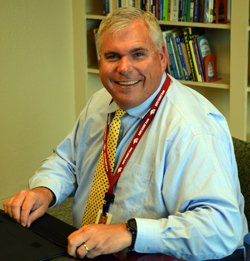A new school for eighth and ninth graders, additional space at elementary buildings and upgraded technology are top priorities of an $81 million bond proposal on the ballot Tuesday, Nov. 5.
Superintendent Scott Smith said the district based initial bond work on projected enrollment growth of 1% over the next five years, but it’s expected to grow even more farther down the road.
“If we grow at a 2% track, by 2031 we’ll have almost 4,500 students, a thousand more students in just over 10 years,” Smith said. “We have to be thoughtful of that.”
The district’s last bond issue dates back to 2002, when voters made the decision to build a new middle school and renovate the high school and other buildings.
Impact on Property Taxes
If approved by voters, it is projected that the debt tax rate would increase by approximately 0.90 mills over the current debt tax rate.
For a $100,000 market value home, this equates to an estimated increase of $45 per year, or $3.75 per month.
For a $200,000 market value home, $90 per year and a $300,000 home, $135.
“The state of Michigan went through a tough stretch economically. There was not a lot of growth, with the exception of a couple of districts from 2008 to 2011 or 12, it was a pretty slow time, and now we’re seeing that pick back up.”
The bond proposal, developed as part of a long-term master plan, addresses the highest priorities and focuses on three key areas:
Learning Environments
- Construct a new eighth-ninth grade building, which would alleviate capacity issues at the high school and provide an age-appropriate transition from the middle school to the high school. The proposed 8/9 building would be located adjacent to the high school, where removing ninth grade students would alleviate capacity issues.
- Demolish the existing 1960s academic wings at Beach and constructing new, modern classrooms
- Relocate preschool and early childhood programming from Cedar Trails to Red Hawk to provide additional space for current kindergarten and first grade students and allow for future student population growth and alleviate current capacity issues. Improvements at Red Hawk would transform the existing sixth grade building to community education, early childhood education and district administration
- Improvements at Cedar Springs Middle School would realign that building from seventh and eighth grade to sixth and seventh grade
- Upgrade educational technology and classroom multimedia as needed
Building and Site Improvements
- Upgrade mechanical systems and building management systems for energy efficiency
- Invest in critical capital improvements – boilers, unit ventilators and roofing as needed
Safety and Security
- Secure building entrances at schools that currently do not have them
- Improve traffic flow, parking and sidewalks at select locations

Proposed 8/9 Building
Smith said eighth and ninth graders would grow and thrive in this new learning environment.
“Eighth graders are bordering on that leap, maturity-wise, for that next level of development,” he explained. “This 8/9 concept is the best way for us to get prepared to address the current needs we have, but also to get prepared for what’s coming down the road.
“We would offer programming in both buildings. Our ninth graders will bounce back and forth throughout the day with access to all varsity athletic programming and extracurriculars.”
Smith said there’s been a little bit of resistance with this part of the proposal because an eighth and ninth grade grade configuration is unique. He countered with the fact that the district has kindergarten and first grade together at Cedar Trails Elementary School, “Who does K-1? Cedar Springs does, and we do it really well.”
‘More Breathing Room’
Space is a major theme of proposed improvements.
Smith said nearly 800 students and families are utilizing the Cedar Trails building. “It’s really crowded. Our proposal would allow us to pull that early childhood programming piece out and relocate all of those programs to Red Hawk Elementary School.”
Pulling the ninth graders out of the high school also alleviates crowding.
“This will give the high school room to breathe because they are currently maxed out,” Smith said. “There’s not enough classroom space, and not enough cafeteria and food service space.
“We must continue to adapt to enrollment and to the spaces that we have and the climate of our voters.”
CONNECT













